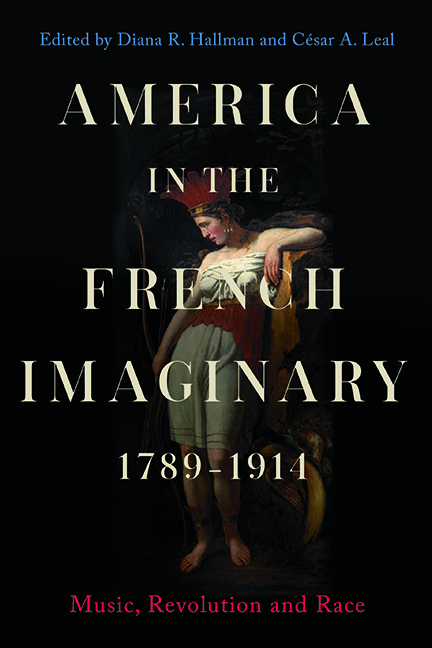Book contents
- Frontmatter
- Dedication
- Contents
- List of Illustrations
- List of Music Examples
- List of Abbreviations
- Editorial Notes
- List of Contributors
- Acknowledgements
- Preface
- Introduction
- Part I American liberté, sauvagerie and esclavage
- Part II Myths of America and Intersecting Identities
- Part III Soundscapes and Sonic Fantasies
- Part IV America, Commodification and Race at the fin de siècle
- Bibliography
- Index
- Music in Society and Culture
5 - ‘The Most Seductive Creole Indolence’: Louis Moreau Gottschalk in the French Press
Published online by Cambridge University Press: 15 September 2022
- Frontmatter
- Dedication
- Contents
- List of Illustrations
- List of Music Examples
- List of Abbreviations
- Editorial Notes
- List of Contributors
- Acknowledgements
- Preface
- Introduction
- Part I American liberté, sauvagerie and esclavage
- Part II Myths of America and Intersecting Identities
- Part III Soundscapes and Sonic Fantasies
- Part IV America, Commodification and Race at the fin de siècle
- Bibliography
- Index
- Music in Society and Culture
Summary
The American Gottschalk: Questions of créolité, Race and Identity
In its 13 April 1845 issue, Le Ménestrel published one of the earliest mentions of Louis Moreau Gottschalk (1829–69) in a French periodical. At the time, he was one month shy of his sixteenth birthday. Misspelling his surname as ‘Gottschalb’, the journal briefly summarised, ‘A pianist of the greatest merit, Mr. Gottschalk, was heard last week at the Salle Pleyel. He played Chopin, Thalberg, and Liszt, so as to merit a first place among our virtuosos.’ By March 1849, just under four years later, the journal La Musique: Gazette de la France musicale published an extended although unattributed paean to Gottschalk and his composition Bamboula. Its author contended,
You have to be creole, composer and performer, to feel and be able to understand all the originality of Bamboula. We have discovered this Creole composer; an American composer, my God! But yes, and a pianist-composer, performing of the highest order, who is still known only in the aristocratic salons of Paris, and whose name soon will have a great impact […]. His name is Gottschalk.
The numerous appearances of the word ‘Creole’ in this review, considered at length later in this chapter, presage decades of reviews in the French press of Gottschalk's performances and compositions, continuing well after his departure from Paris, in language that both highlighted his Creole heritage and underscored the romantic nature and technical challenges of many of his works.
‘Creole’ is slippery to define; its meaning is dependent upon the circumstances and contexts of the person or thing to which it is meant to refer. In eighteenth- and nineteenth-century Louisiana, ‘Creole’ was a loosely defined and wide-ranging term that generally applied to people of any racial heritage – European, African, Native American, or any mixture thereof – who were born in Louisiana. To the French audiences and critics who first encountered Gottschalk and his music in the 1840s, however, the word carried additional implications; not only applicable to Louisiana-born United States citizens, it could also refer to citizens of the French Caribbean, West Indies, or Antilles colonies as well. The French understanding of the concept of ‘créole’ – in contrast to the Louisianan interpretation of the same term – was further fraught with complex constructions of exoticism and barbarism, spectacle and nostalgia, especially in its connections with Blackness and colonialism.
- Type
- Chapter
- Information
- America in the French Imaginary, 1789-1914Music, Revolution and Race, pp. 172 - 195Publisher: Boydell & BrewerPrint publication year: 2022



